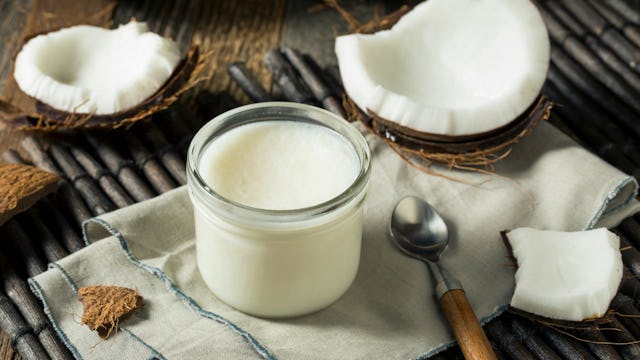Why You Should Stop Worshiping At The Altar Of Coconut Oil

It seems like coconut oil gained its popularity overnight. Suddenly my friends and I were talking about everything that could be cured by coconut oil, and if you didn’t have a gallon sized jar in at least 2 places in your home you were behind the times.
Who cares if it cost a shit ton of money and you practically broke your wrist trying to scrape it out of its container? Coconut oil seems to be the answer to everything.
If you have chapped lips, coconut oil is much better than lip glosses so use that instead!
Need a good lube? Reach for the coconut oil.
Need a good face moisturizer? Why not use it for that too?
If you want to rid yourself of toxins, you can perform oil-pulling by getting your mouth full of oil, swishing it around, then spitting it out.
I’ll admit I’ve tried all of the above. I got the worst sunburn of my life, and my pores were more clogged than the subway at quitting time when I used it on my face, thankyouverymuch.
Coconut oil has been said to be the magic potion for weight loss too. I’ve even had some friends put it in their coffee to make them feel full and not eat as much during the day.
Well, I hate to burst your coconut oil bubble, but it looks like it’s time to step away from the kryptonite, according to Harvard professor Karin Michels, who calls the elixir we’ve all been depending on to help us live our best lives “poison.”
Michels even goes as far as saying our beloved oil is “one of the worst foods you can eat,” because of all the saturated fat it contains which has been linked to heart disease, explains Vox.
Her YouTube video has over a million views and I’m guessing those that have been chugging the popular oil for the past few years want to hear what she has to say.
Dr. Qi Sun is an assistant professor in the Department of Nutrition at the Harvard T.H. Chan School of Public Health and explains in an article for Harvard Health, “If you want to lower your risk of heart disease, coconut oil is not a good choice.”
It’s important to note these articles are talking about eating the oil, so as far as slathering it in your hair or using it as a lube, the jury is still out.
And while we do know that rubbing some on your face isn’t going to affect your cholesterol or increase your risk for heart disease, you should know it’s not going to do anything good for the skin on your face.
When you use it as a makeup remover or moisturizer, you are trapping all the dirt and oil from the day and locking it in for the night. So, not only does this fad give you extra saturated fat, it delivers blackheads and little white bumps in its wake too.
Is that enough to get you to cut down on using it if it’s your oil of choice? While it has been known to have positive health benefits, if you do eat it, how much is too much?
Walter C. Willett, M.D. of Harvard School of Public Health tells Harvard Health that coconut oil is about 90% saturated fat, and many people are using it instead of butter which is 64% saturated fat, or even lard which weighs in at 40%.
The fact is, too much saturated fat, no matter how it’s ingested, is unhealthy “because it raises ‘bad’ LDL cholesterol levels, which increases the risk of heart disease,” explains Dr. Willett. He advises using coconut oil “sparingly” and says most of the studies to date on coconut oil have “consisted of short-term studies” so we aren’t really sure how it can affect our hearts long-term at this point.
With so many other oils available that have less saturated fat, and products that are actually made for your face, it’s okay to put the coconut oil down.
Maybe buy an organic moisturizer and some avocado oil and mix it up a bit because really, coconut oil isn’t all that.
But if staying in on a Friday night and making a body scrub with coconut oil and raw sugar is your jam, go ahead, you certainly don’t have to give up all your coconut oil love.
Do your research and stop thinking it’s the answer to all your problems, because it certainly isn’t a cure-all to everything. Coconut oil is like everything else — moderation is still needed and we need to stop suggesting it for every damn thing.
This article was originally published on